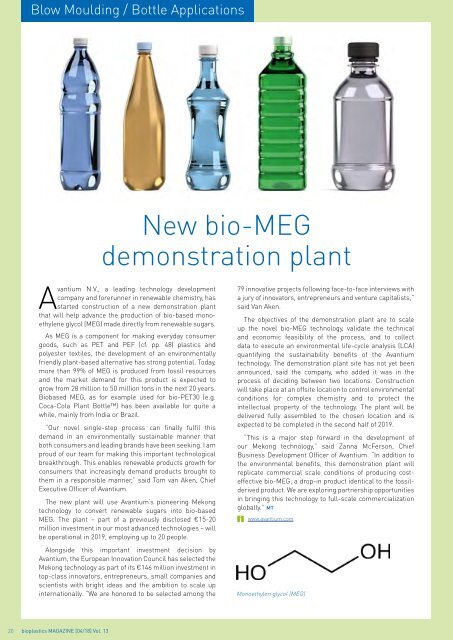Issue 04/2018
bioplasticsMAGAZINE_1804
bioplasticsMAGAZINE_1804
Create successful ePaper yourself
Turn your PDF publications into a flip-book with our unique Google optimized e-Paper software.
Blow Moulding / Bottle Applications<br />
New bio-MEG<br />
demonstration plant<br />
Avantium N.V., a leading technology development<br />
company and forerunner in renewable chemistry, has<br />
started construction of a new demonstration plant<br />
that will help advance the production of bio-based monoethylene<br />
glycol (MEG) made directly from renewable sugars.<br />
As MEG is a component for making everyday consumer<br />
goods, such as PET and PEF (cf. pp. 48) plastics and<br />
polyester textiles, the development of an environmentally<br />
friendly plant-based alternative has strong potential. Today,<br />
more than 99% of MEG is produced from fossil resources<br />
and the market demand for this product is expected to<br />
grow from 28 million to 50 million tons in the next 20 years.<br />
Biobased MEG, as for example used for bio-PET30 (e.g.<br />
Coca-Cola Plant Bottle) has been available for quite a<br />
while, mainly from India or Brazil.<br />
“Our novel single-step process can finally fulfil this<br />
demand in an environmentally sustainable manner that<br />
both consumers and leading brands have been seeking. I am<br />
proud of our team for making this important technological<br />
breakthrough. This enables renewable products growth for<br />
consumers that increasingly demand products brought to<br />
them in a responsible manner,” said Tom van Aken, Chief<br />
Executive Officer of Avantium.<br />
The new plant will use Avantium’s pioneering Mekong<br />
technology to convert renewable sugars into bio-based<br />
MEG. The plant – part of a previously disclosed €15-20<br />
million investment in our most advanced technologies – will<br />
be operational in 2019, employing up to 20 people.<br />
Alongside this important investment decision by<br />
Avantium, the European Innovation Council has selected the<br />
Mekong technology as part of its €146 million investment in<br />
top-class innovators, entrepreneurs, small companies and<br />
scientists with bright ideas and the ambition to scale up<br />
internationally. “We are honored to be selected among the<br />
79 innovative projects following face-to-face interviews with<br />
a jury of innovators, entrepreneurs and venture capitalists,”<br />
said Van Aken.<br />
The objectives of the demonstration plant are to scale<br />
up the novel bio-MEG technology, validate the technical<br />
and economic feasibility of the process, and to collect<br />
data to execute an environmental life-cycle analysis (LCA)<br />
quantifying the sustainability benefits of the Avantium<br />
technology. The demonstration plant site has not yet been<br />
announced, said the company, who added it was in the<br />
process of deciding between two locations. Construction<br />
will take place at an offsite location to control environmental<br />
conditions for complex chemistry and to protect the<br />
intellectual property of the technology. The plant will be<br />
delivered fully assembled to the chosen location and is<br />
expected to be completed in the second half of 2019.<br />
“This is a major step forward in the development of<br />
our Mekong technology,” said Zanna McFerson, Chief<br />
Business Development Officer of Avantium. “In addition to<br />
the environmental benefits, this demonstration plant will<br />
replicate commercial scale conditions of producing costeffective<br />
bio-MEG; a drop-in product identical to the fossilderived<br />
product. We are exploring partnership opportunities<br />
in bringing this technology to full-scale commercialization<br />
globally.” MT<br />
www.avantium.com<br />
Monoethylen glycol (MEG)<br />
20 bioplastics MAGAZINE [<strong>04</strong>/18] Vol. 13


















